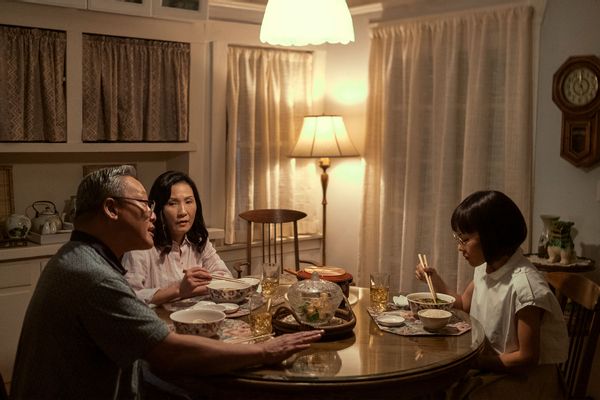I felt a sort of vicarious satisfaction as I watched Ali Wong's character Amy in Netflix's dramedy "Beef" let loose on her newfound nemesis Danny (Steven Yeun), tossing objects at his windshield and chasing his car through the streets of Los Angeles. Amy's long-festering frustration and repressed anger from hiding her true feelings from loved ones explodes on Danny.
Amy and I believed our parents' love and approval were conditional.
Like Amy, I am a people-pleasing perfectionist. I'm fortunate to have a supportive husband, great kids, and in theory nothing to complain about. But like many women, I struggle to manage work, relationships and more. My kids are grown, and I don't have to contend with modern-day extreme parenting, which for Amy includes mindfulness classes and organic gardening playgroups.
In the pilot of the 10-episode limited series, Amy (almost literally) runs into struggling contractor Danny in a parking lot. After their wild road-rage altercation, Danny tracks her down to her beautiful house. She doesn't know the man knocking at her door is the one she tried to run off the road.
Tellingly, Amy worries she was rude when she spoke to the unknown man through a speaker and lets him in. Once inside, Danny needles her, pointing out supposed remodeling mistakes throughout her house. He urinates all over her bathroom, and Amy plots her revenge. The tit for tat grows more severe – and damaging – as the show progresses.
Crucially, with Danny, someone outside her carefully curated world, Amy can expose her true feelings. Their relationship, such as it is, provides the one release valve for her pent-up rage from dealing with the non-obvious flaws in her life. It turns out her handsome husband is a clueless momma's boy. As the breadwinner, Amy works long hours while her husband creates unsellable art. Her passive-aggressive mother-in-law constantly pushes Amy's buttons. Stressed about selling her business so she can spend more time with her child, Amy lives in a constant state of anxiety.
 Beef (Netflix)To Amy, everything – her home, her family, her, had to be perfect. For women juggling multiple roles – and expected to do them all with aplomb, exhaustion and frustration can fester within. But for those like Amy and me who grew up with emotionally distant parents in dysfunctional homes, we can become anxious overachievers.
Beef (Netflix)To Amy, everything – her home, her family, her, had to be perfect. For women juggling multiple roles – and expected to do them all with aplomb, exhaustion and frustration can fester within. But for those like Amy and me who grew up with emotionally distant parents in dysfunctional homes, we can become anxious overachievers.
In a childhood flashback, Amy overhears her father complain to her mother that he didn't even want a child. Young Amy then imagines a witch from a book she's reading come to life and says: "I'm always watching, I can't tell anyone your secrets. Because no one would love you."
Amy and I believed our parents' love and approval were conditional. My parents also bickered regularly. Unable to stop our parents from fighting, we strove to control what we could.
Failure is not an option for many children of immigrants.
Amy builds a successful company and an enviable suburban house. I threw myself into academics, graduating as a high school valedictorian. When I won several awards and accolades at my graduation, my dad took lots of photos. His attention and pride lasted one week. I later earned a scholarship to a top MBA program. Anxiety fueled my drive. However, it's impossible to please an unpleasable parent.
 Beef (Netflix)Amy and I were both aware of how much our immigrant parents sacrificed for us. Amy's mother told her she never saw birds until she came to America because people had to eat them during the Vietnam War. My parents fled communist China with two suitcases to Taiwan. Later, my father arrived by boat in America with $50 in his pocket, toiling as a dishwasher on weekends while attending graduate school. Failure is not an option for many children of immigrants.
Beef (Netflix)Amy and I were both aware of how much our immigrant parents sacrificed for us. Amy's mother told her she never saw birds until she came to America because people had to eat them during the Vietnam War. My parents fled communist China with two suitcases to Taiwan. Later, my father arrived by boat in America with $50 in his pocket, toiling as a dishwasher on weekends while attending graduate school. Failure is not an option for many children of immigrants.
I too was a powder keg set to explode, working and raising three children, trying to project the image of a model wife and mother, until I unfurled my wrath on my family. As it happened, my fury was connected to a remodel of my house. My three children and my husband and I found ourselves sharing one small room while walking through a dusty house with workers stomping and drilling and hammering throughout the day. I cooked ramen on a hot plate in our one working bathroom. Throughout the remodel, I tried to remain calm. I didn't want to share my frustration with my husband.
The final straw came when our contractor told us our kitchen would be delayed several weeks because he'd mismeasured a corner cabinet. My husband turned to me and said, "Why didn't you recheck the measurements?"
I shrieked at him and threw his beloved college mug and other mementos into the dumpster occupying our driveway. When my youngest child sobbed, I had the sense to stop, and then I had to crawl into the dumpster to retrieve the items.
Want a daily wrap-up of all the news and commentary Salon has to offer? Subscribe to our morning newsletter, Crash Course.
At one point, Amy says, "I have worked so hard for this shit." Yet when she reaches what she longed for – the sale of her company for $10 million – she's unable to relax with her family beside the pool of their new vacation home. She insists on helping their new nanny.
While I initially felt a kinship with Amy's repressed anger, "Beef" is ultimately a cautionary tale of the consequences of repressed emotions. I was encouraged that Amy could finally share her feelings with at least one person, even if he was a virtual stranger. But by the end of the series, it's clear she should have been more honest with her husband all along. Fortunately for me, the repercussion of my outburst was digging through a dumpster. For Amy, her explosion – while often hilarious – is far more damaging.
Amy says, "I don't want anyone to see who I really am."
Hiding our true selves from our loved ones can be more harmful in the end.
Read more
about this topic

Shares